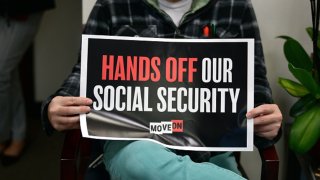
- Workers may have jobs where they pay into Social Security or earn pension benefits.
- When they have both, their Social Security benefits may be adjusted to reflect that.
- There's growing support in Congress to either revise those rules or eliminate them altogether.
When Dave Bernstein, 87, started working at the U.S. Postal Service in February 1970, he was making $2.35 an hour.
To supplement his income, he also took on other work. Years later, Bernstein decided in 1992 to take a voluntary retirement.
"We knew there was going to be a reduced pension because of the early out," said Phyllis Bernstein, Dave's wife, who is 84.
Get New England news, weather forecasts and entertainment stories to your inbox. Sign up for NECN newsletters.
But what came next was something the couple did not expect.
While Dave was expecting a monthly Social Security check of around $800, it ended up being just about half that amount – around $415 – even though he had earned the required 40 credits to be fully insured by the program. The benefits were adjusted based on rules for workers who earn both pension and Social Security benefits.
More from Personal Finance:
Will Social Security be there for me when I retire?
Medicare open enrollment may cut retirees' health-care costs
How much your Social Security check may be in 2024
Money Report
The couple, who reside in Tampa, Florida, have had a different retirement than they envisioned due to the lower income.
Phyllis kept working until she was 82. They have also turned to family for financial support.
Their lifestyle is frugal, with home-cooked meals and cars they kept for 20 years, or "until the wheels were falling off," the couple jokes.
But their limited resources have made traveling to Australia and New Zealand – Phyllis' dream – out of reach.
"When he retired, I was working," Phyllis said. "We just couldn't do the travel."
Today, Dave is pushing for the Social Security rules that reduced his benefits to be changed.
His union, the American Postal Workers Union, has endorsed the Social Security Fairness Act, a bill proposed in Congress that would repeal Social Security rules known as the Windfall Elimination Provision, or WEP, and Government Pension Offset, or GPO, that reduce benefits for workers had positions where they did not pay Social Security taxes, also called non-covered earnings.
The legislation has support from other organizations that represent public workers, including teachers, firefighters and police.
The bill has overwhelming bipartisan support in the House of Representatives – 300 co-sponsors – at a time when that chamber has been politically divided. That support recently prompted House lawmakers to send a letter to leaders of the Ways and Means Committee to request a hearing.
The Social Security Fairness Act has also been introduced in the Senate, with support from 49 leaders from both sides of the aisle.
Yet some experts say just getting rid of the rules may not be the most effective way of making the system fairer.
How the WEP, GPO rules work
The WEP applies to how retirement or disability benefits are calculated if a worker earned a retirement or disability pension from an employer who did not withhold Social Security taxes and qualifies for Social Security from work in other jobs where they did pay taxes into the program.
Social Security benefits are calculated using a worker's average indexed monthly earnings, and then using a formula to calculate a worker's basic benefit amount. For workers affected by the WEP, part of the replacement rate for the average indexed monthly earnings is brought down to 40% from 90%.
The GPO, meanwhile, reduces benefits for spouses and widows or widowers of recipients of retirement or disability pensions from local, state or federal governments.
Under the GPO, Social Security benefits are reduced by two-thirds of the government pension. If two-thirds of the government pension is more than the Social Security benefit, the Social Security benefit may be zero.
The impact of the rules is far-reaching, according to Edward Kelly, general president of the International Association of Fire Fighters. Many firefighters work in second jobs in the private sector as cab drivers, bartenders or truck drivers, where they earn credits toward Social Security.
"They steal their money, because they're also public employees," said Kelly, who describes his union members as "passionately angry" about the issue.
"It affects hundreds of thousands, if not millions of public employees that paid into Social Security and essentially are being penalized because they also happen to be public servants, whether they are teachers, cops and, obviously, firefighters," Kelly said.
Why experts say another fix may be better
The WEP and GPO rules were intended to make it so workers who pay Social Security taxes for their entire careers are treated the same as those who do not.
But under those current rules, some beneficiaries receive lower benefits than they would have if they paid into Social Security for all of their careers, while others receive higher benefits, according to the Bipartisan Policy Center.
Yet repealing the WEP and GPO rules would result in Social Security benefits that are "overly generous" for non-covered workers, research has found.
Part of what may create that advantage is that Social Security benefits are progressive, and therefore replace a larger share of income for lower earners. So someone who only has part of their salary history in Social Security may get a higher replacement rate without considering their pension income.
Fully repealing the WEP and GPO rules may also come with higher costs at a time when the program facing a funding shortfall. The change would add an estimated $150 billion to the program's costs in the next 10 years, according to the Center on Budget and Policy Priorities.
Another way of handling the disparity may be to create a proportional approach to income replacement. Instead of the WEP, workers' benefits would be calculated based on all of their earnings and then adjusted to reflect the share of their careers that were in jobs covered by Social Security. A similar approach may be taken with the GPO.
Certain bills on Capitol Hill propose a proportional approach.
However, a proportional formula may not solve all the inequities in the current system, according to Emerson Sprick, senior economic analyst at the Bipartisan Policy Center, which has prompted to think tank to work on refining its proposal.
'Extremely complex' to understand
An important advantage to reforming the current formulas would be making it easier for workers to understand and plan for their retirements.
"It is definitely extremely complex, and very hard for folks preparing for retirement or in retirement, to understand what it means for their benefits," Sprick said.
Social Security statements that provide retirement benefit estimates do not take these rules into account.
Consequently, many workers find out their benefits are adjusted when they are about to retire.

"The young guys don't pay attention to it because it's too far out; they're not worried about it," Kelly said of the firefighters.
"It's not until you're ready to go out the door that you actually start paying attention to what you're going to have to live off when you actually retire," he added.
The reductions to their Social Security benefits can be a shock.
For beneficiaries like the Bernsteins who start out with lower benefits, it can be difficult to catch up, even after a record 8.7% Social Security cost-of-living adjustments went into effect this year.
"Gas this summer and in the spring at $4 a gallon ate that money up like it wasn't even there," Dave Bernstein said.






